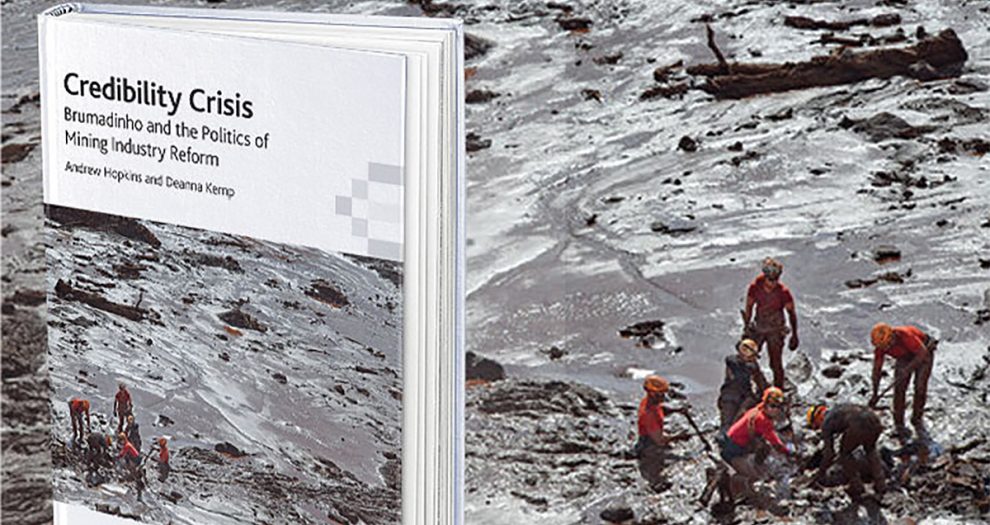Readers will no doubt be aware of the succession of tailings dam failures and catastrophes around the world including Mount Polley in Canada in 2014, Samarco in Brazil in 2015 where 19 people died and a major river was severely polluted for 900km to the ocean. Later in early 2019, 270 people, mainly mine workers in the canteen on their lunch break, were killed in a post-failure mudflow – also in Brazil near the village of Brumadinho.
This ‘last straw’ placed the largest international mining companies, who are members of the International Council for Mining and Metals (ICMM), under pressure from ethical investors represented by PRI and from the United Nations Environment Program, to immediately commit to a process for developing a new global industry standard on tailings management.
Emeritus professor Andrew Hopkins, AO (ANU) and professorial fellow Deanna Kemp (UQ) were two of seven independent global experts who developed and advised three commissioning parties on the new standard, which was released in August 2020. The book’s authors confirmed that while the standard undoubtedly provides a step change improvement, ICMM ‘red line’ vetoes on various provisions meant it had disappointed stakeholders by not going further. They also highlight that how the standard to be implemented will be critical for the future success of saving lives, protecting the environment, and enabling major mining projects to continue. As suggested by its title, the book provides a rare insider account of the politics and pressures behind the scenes, and both strengths and weaknesses of the compromise text reflected in the new standard.
The book notes that one recommendation from Kym Bills’ own review of NSW mine safety legislation and regulation released in October 2020 (recommendation 23) was for the NSW Resources Regulator to reference the standard in guidance, and consider potential legislative change. Such local action is important and a robust international regime is clearly desirable to support national and provincial regulators of varying capabilities and independence around the world.
What do Hopkins and Kemp consider to be some key strengths and weaknesses of the standard? The opening sentence of its preamble that it “strives to achieve the ultimate goal of zero harm to people and the environment with zero tolerance for human fatality” sets the scene in a very positive manner. Like many aspirational statements, this was not fully translated into actions such as minimising the use of upstream tailings dams that are more prone to failure. These facilities can involve such potentially catastrophic consequences that residual risk after design should be considered intolerable, especially as the dam is progressively built higher, if maintenance is poor, or the facility is sold to a party without the means to ensure end-of-life integrity. Unfortunately, the expert group’s terms of reference decreed banning upstream dams is beyond the new standard’s scope. Chronic slower leaks with long-term environmental impacts and dumping waste in rivers were also considered out of scope.
Powerful ICMM members are exceptionally good at extraction, at driving shareholder returns and in tough negotiations with those who might host a mining project. Ensuring long term sustainability is important so ‘social licence’ continues for the industry in the longer term. Kemp previously wrote about the importance of countervailing power and Hopkins on bonuses, incentives and accountability structures to help deal with these dilemmas. The fruits of both are reflected in the book. Having a senior executive accountable for tailings dam integrity is an important initiative in the standard but, as we see in Australia’s workplace health and safety laws and due diligence, Boards and CEOs need to be accountable too – and not simply designate a ‘fall guy’. However, the authors recognise that varying national laws make such accountabilities difficult to achieve in practice.
The issue of obtaining ‘free, prior and informed consent’ (FPIC) from relevant indigenous people is accepted in ICMM policy but Hopkins and Kemp show that it has been compromised in practice. The 2020 destruction of 46,000-year-old Aboriginal rock art and sacred material at Juukan Gorge in Western Australia underlined the importance of both obtaining and maintaining such consent. This cultural tragedy changed the negotiating parameters for FPIC and influenced the standard’s final content. This means if properly implemented it can, and should, amount to genuine indigenous participation.
For the sake of industry and all those who might sadly be impacted by tailings dam failures, we must hope gaps in the standard can be progressively filled and appropriate and audited accountabilities and financial arrangements made within and beyond ICMM members. The book provides a fascinating and insightful guide to achieving this. It is highly recommended for those in the industry, regulators and policy makers, and students who want to better understand the real world machinations of the global mining industry and large business enterprises more generally.
Kym Bills, Australian Institute of Health and Safety














Add Comment